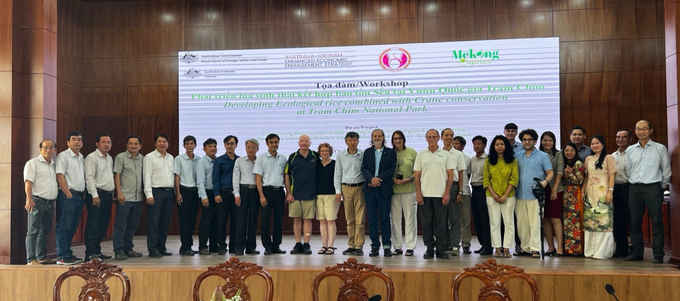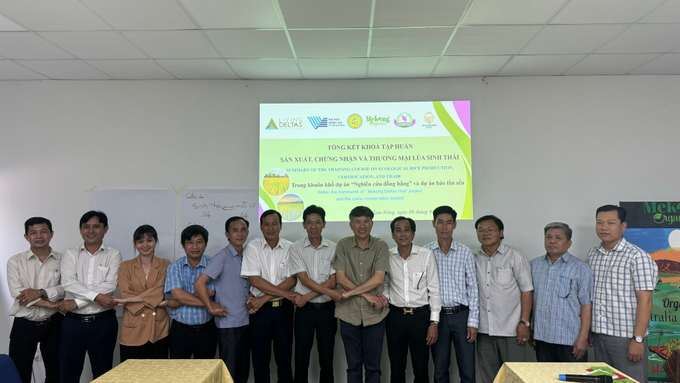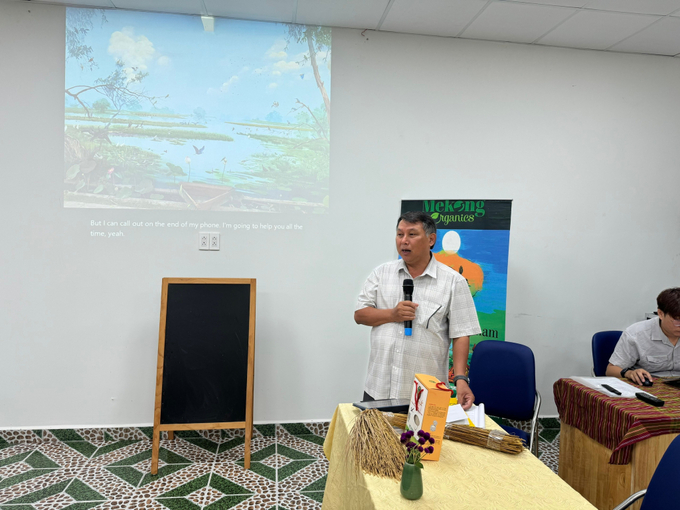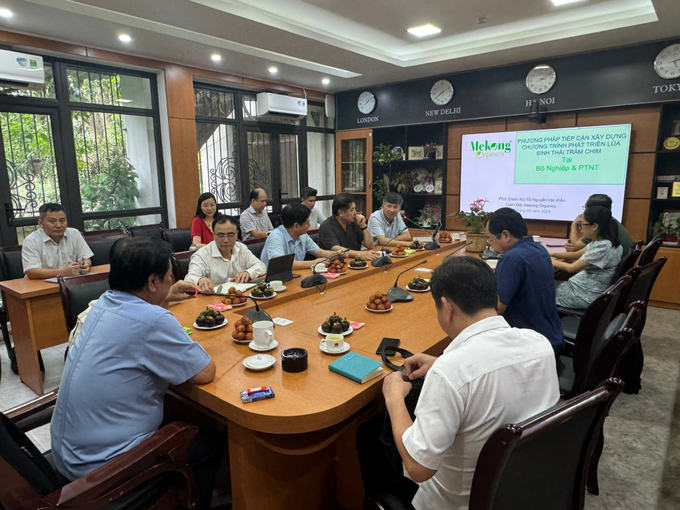June 17, 2025 | 19:22 GMT +7
June 17, 2025 | 19:22 GMT +7
Hotline: 0913.378.918
June 17, 2025 | 19:22 GMT +7
Hotline: 0913.378.918

On January 13, 2024, Mekong Organics and the Dong Thap People's Committee jointly organized an international workshop on regenerative ecological agriculture, as part of the AVEG project funded by DFAT for Mekong Organics.
Earlier, Mekong Organics and the People's Committee of Dong Thap Province co-organized an international workshop on regenerative ecological agriculture as part of the AVEG project funded by DFAT for Mekong Organics. Additionally, Mekong Organics advised the People's Committee of Tam Nong District on establishing a specialized team to implement the ecological agriculture program.
On July 2, 2024, the People's Committee of Tam Nong District issued Decision No. 663/QD-UBND-TL, establishing a support team for ecological rice production combined with the conservation and development of the Sarus Crane at Tram Chim National Park for the period 2023 - 2027, with a vision extending to 2032. This team is designed to raise awareness about ecological agriculture and equip members with the necessary skills to effectively implement the program.
Mekong Organics, in collaboration with the People's Committee of Tam Nong District, the District Department of Agriculture and Rural Development, Wildbird Company, and the Climate Change Institute at An Giang University, organized a series of sharing sessions from September 7 to September 9, 2024, as part of the Living Deltas Hub project. These sessions aimed to introduce participants to the fundamental concepts of ecological agriculture and showcased successful experiences from Australia in developing such agricultural practices.
Additionally, the discussions outlined specific steps necessary for establishing a certified ecological agriculture production area that meets the standards set by the Vietnam Intellectual Property Office. By leveraging this knowledge, local authorities are expected to create a comprehensive plan to effectively utilize and develop specific plots of land that meet the necessary conditions for cultivating ecological rice.

The People's Committee of Tam Nong District has decided to register the project for the establishment, management, and development of the certification trademark "Tram Chim ecological rice" for products and services derived from rice grown under the ecological model in the district.
Following the results of the trademark selection conducted during the training session on September 9, 2024, the People's Committee of Tam Nong District has officially decided to register the project aimed at creating, managing, and developing the certification trademark "Tram Chim ecological rice". This trademark will apply to products and services derived from rice cultivated using ecological practices in Tam Nong District, Dong Thap province. This initiative is a significant expression of the collective dedication of local farmers, government authorities, and various community organizations in Tam Nong.
Moreover, Mekong Organics has proposed that the People's Committee of Dong Thap Province, along with the Department of Science and Technology and the Department of Agriculture and Rural Development, include the "Tram Chim ecological rice" program as part of the province's specialized projects. This program focuses on promoting scientific research and facilitating the transfer of knowledge and technology related to ecological agriculture specifically within Tam Nong District.

Engineer Nguyen Tran Thuc, Director of the Plant Cultivation and Protection Sub-Department of Ca Mau province, shared his experience in successfully establishing the brand for the ecological rice-growing area in Ca Mau.
At the workshop, farmers from Tam Nong district had the opportunity to learn from the experiences of the Tan Dat Cooperative, which specializes in organic rice production and agricultural services in Trung Ngai commune, Vung Liem, Vinh Long. This cooperative has achieved significant success in the production, processing, and marketing of organic rice.
Through this event, a connection was established between farmer Nguyen Van Man, who operates in parcel number 25 in Phu Duc commune, and the Tan Dat Cooperative. They are set to embark on a journey to produce, market, and commercially process ecological rice. The plan is to start cultivating 6 hectares of ecological rice in the upcoming winter-spring season of 2024-2025. This initiative marks a promising first step towards fostering collaboration between the cooperative - known for its successful organic rice ventures - and farmers who are just beginning to explore ecological rice production in Tam Nong district, Dong Thap province.

The experience-sharing session at the Ministry of Agriculture and Rural Development on September 15, 2024, focused on the development of Tram Chim ecological rice, organized by Mekong Organics at the invitation of Minister Le Minh Hoan.
Representatives from Mekong Organics emphasized that the successful transition to an ecological agriculture system is contingent upon the active participation of the entire political framework in Vietnam. They highlighted that it is essential for programs initiated by the Ministry of Agriculture and Rural Development (MARD) and local government bodies to prioritize training initiatives aimed at raising awareness about ecological agriculture. This training should be directed at all levels of the political system, encompassing various specialized sectors, government agencies, civil society organizations, businesses, consumers, and farmers themselves.
At present, Mekong Organics is collaborating with the Tam Nong District People's Committee and the Tam Nong Department of Agriculture and Rural Development to facilitate the registration of the "Tram Chim ecological rice" trademark for the entire district. This initiative is designed to create a strategic plan for cultivating ecological rice in designated land areas that are suitable for such practices. The district has officially submitted Proposal No. 3519/UBND-KTN to the Dong Thap Department of Science and Technology, seeking approval for the trademark development project. Mekong Organics is actively urging the department to expedite the approval process.
Moreover, Mekong Organics is working to mobilize resources, including expertise from international specialists and financial support, to enhance the capabilities of local farmers in production and processing. This effort also includes developing a strong brand identity for the agricultural products of Tam Nong district. In addition, the organization aims to establish connections between local farmers and businesses, facilitating the sale and distribution of ecological and organic agricultural products to broader markets.
Translated by Phuong Linh
/2025/06/12/3721-2-202745_83.jpg)
(VAN) TH made an impression at Seoul Food 2025 with its line of natural beverages, paving the way for Vietnamese food products to enter the South Korean market.

(VAN) Soc Trang's success in rice exports stems from a strategy of developing fragrant and specialty rice cultivation areas and standardizing production toward low-emission practices.
/2025/06/11/1311-5-120811_839.jpg)
(VAN) The pig farming industry is facing the challenge of comprehensive restructuring to meet requirements for quality, safety, traceability, and market expansion both domestically and for export.

(VAN) Vietnam considers participating in ALGROALBA in order to expand agricultural production, coordinate the assessment and effective exploitation potential land.
/2025/06/05/5314-1-184727_407.jpg)
(VAN) From seemingly worthless fish scales and skin, enzymes and lactic ferments can transform by-products into peptides, opening a sustainable, effective business direction and elevating Vietnamese seafood.

(VAN) TTC AgriS and IFC signed a strategic partnership to develop a sustainable agricultural value chain, aiming to achieve the Net Zero target by 2035.

(VAN) Seafood by-products are opening a new path, combining green growth and technological innovation to enhance the industry's value.